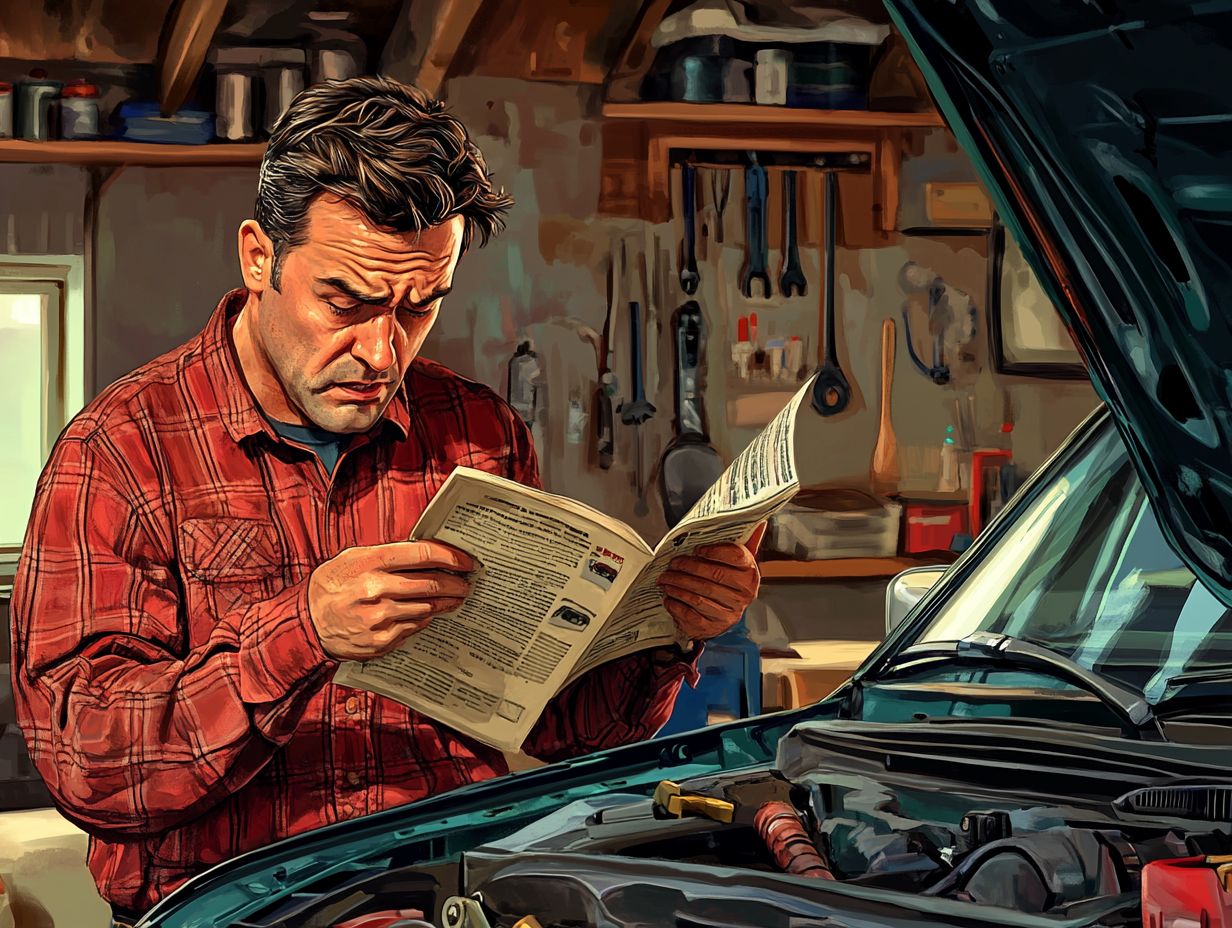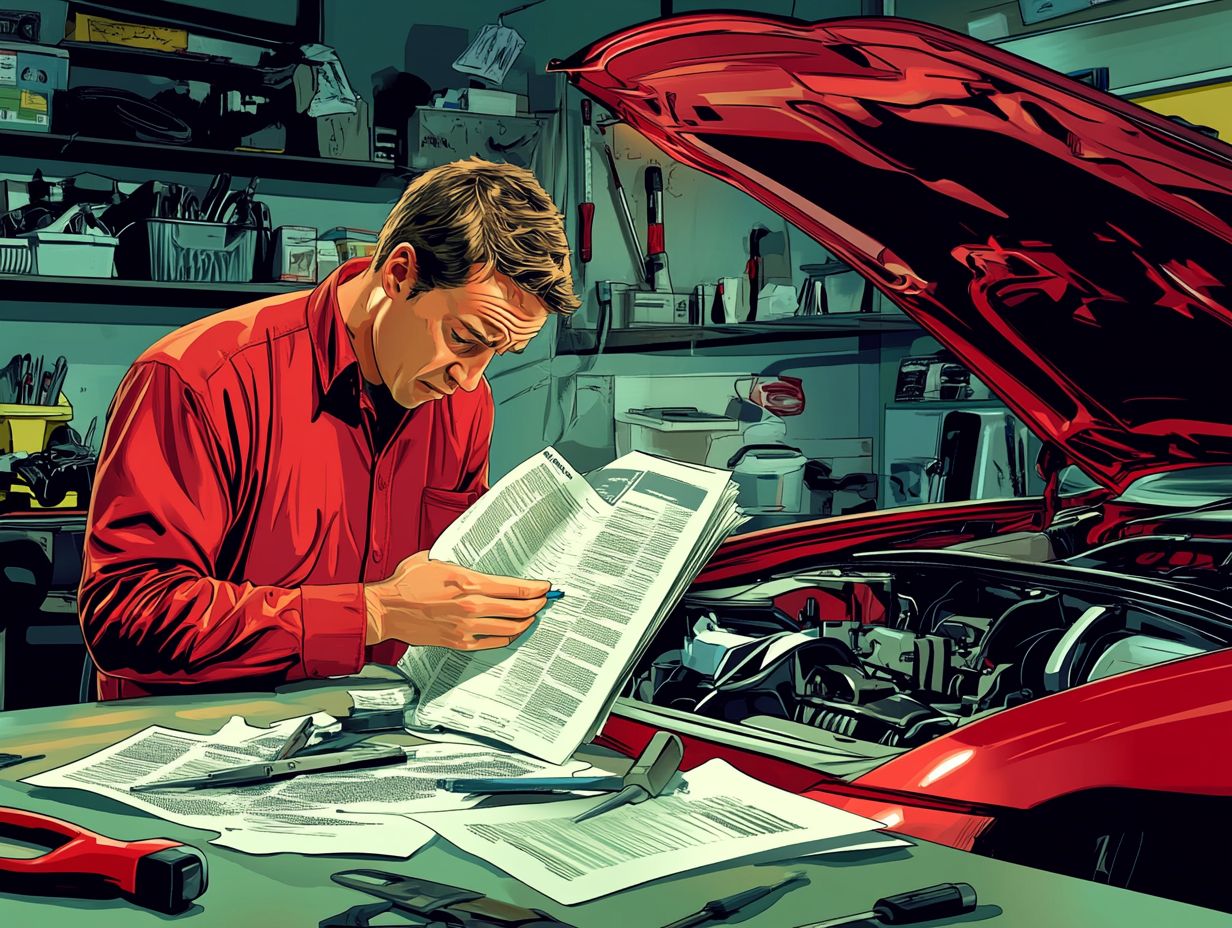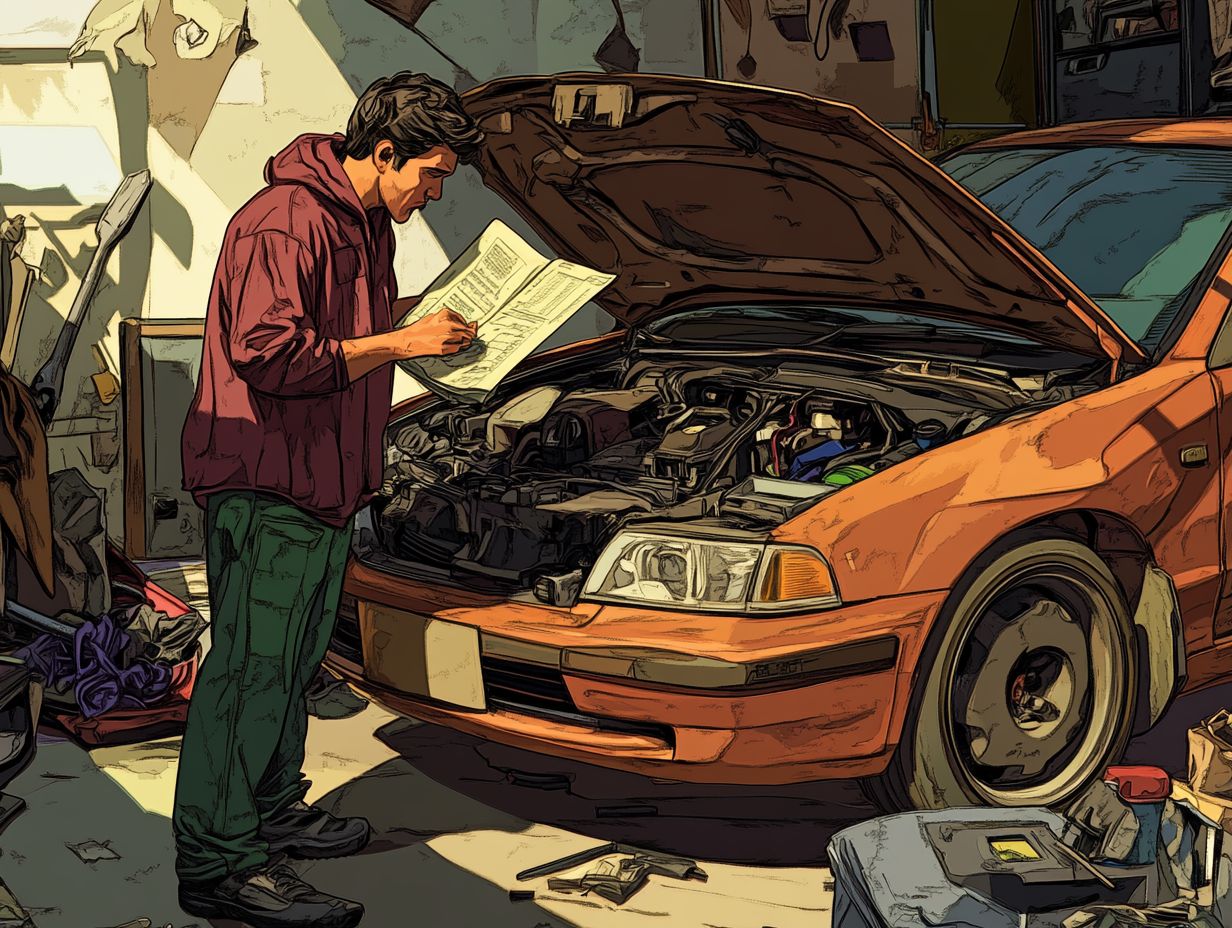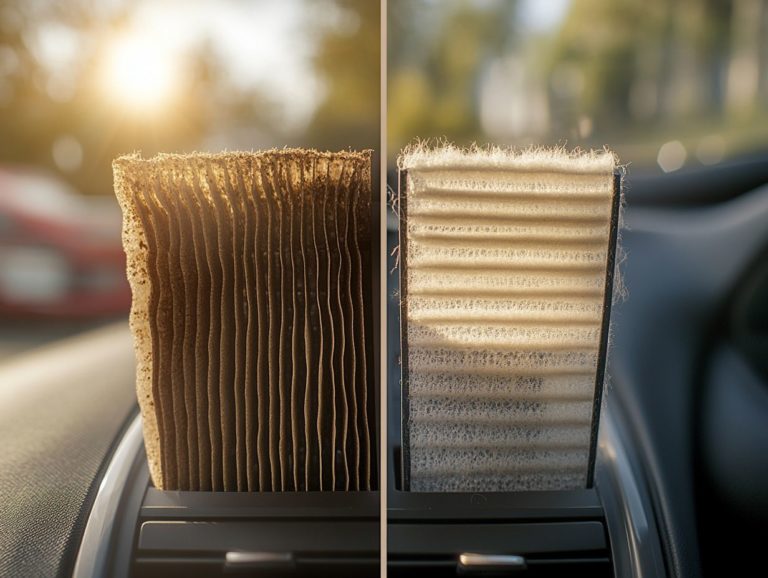Common Maintenance Mistakes New Car Owners Make
Excited about your new ride? Don’t let simple mistakes ruin your joy on the road! Owning a new car can be an exhilarating experience, filled with the thrill of the open road and the scent of that fresh interior. However, it also carries responsibilities that can profoundly influence your vehicle’s performance and longevity.
Many new car owners unknowingly fall into maintenance traps that could result in costly repairs later on. From overlooking regular oil changes to opting for the wrong type of fuel, these seemingly minor oversights can impact not only your car’s efficiency but also your financial well-being.
This article sheds light on the most common maintenance mistakes and provides valuable insights on keeping your vehicle in top-notch condition. Whether you re a first-time car owner or simply seeking to refresh your knowledge, understanding these pitfalls can lead to improved car care and a sense of reassurance on the road.
Contents
- Key Takeaways:
- 1. Neglecting Regular Oil Changes
- 2. Not Checking Tire Pressure Regularly
- 3. Skipping Routine Maintenance Checks
- 4. Ignoring Warning Lights
- 5. Using the Wrong Fuel
- 6. Not Cleaning the Car Regularly
- 7. Overlooking Small Issues
- 8. Not Following the Recommended Maintenance Schedule
- 9. Not Using the Right Products for Cleaning and Maintenance
- 10. Not Keeping Track of Maintenance Records
- How Can These Mistakes Affect the Car’s Performance and Longevity?
- Frequently Asked Questions
- Are you making these common maintenance mistakes as a new car owner?
- Why is it important to follow the recommended maintenance schedule for my new car?
- How often should I change my oil in my new car?
- What are some warning signs that my new car may need maintenance?
- Why is it important to regularly check my tire pressure?
- Can I save money by performing my own maintenance on my new car?
Key Takeaways:
- Neglecting regular oil changes can lead to engine damage and lower performance.
- Regularly checking tire pressure is crucial for safety and fuel efficiency.
- Skipping routine maintenance checks can result in costly repairs and potential breakdowns.
1. Neglecting Regular Oil Changes
Neglecting regular oil changes is one of the most crucial automotive mistakes you can make. This significantly impacts your car’s engine performance and overall lifespan. It’s essential to weave this task into your routine maintenance schedule, preferably through trusted service providers like Accurate Automotive in Colorado.
Research indicates that around 70% of vehicle breakdowns stem from poor maintenance, with a notable portion linked to infrequent oil changes. Experts at AAA stress that fresh oil is vital for lubricating engine components, preventing friction and wear that can lead to serious issues.
You ll often see TikTok influencers in the car community underscoring the pitfalls of ignoring these vital services. Many drivers end up paying high repair bills, with engine rebuilds averaging between $2,500 and $4,000. The repercussions of skipping oil changes are dire over time, dirty oil loses its effectiveness, leading to overheating and failures of essential components, ultimately jeopardizing your vehicle’s performance.
2. Not Checking Tire Pressure Regularly
Regularly checking your tire pressure is essential for safe driving and optimal fuel efficiency, yet many vehicle owners tend to overlook this crucial maintenance step. This oversight can lead to a range of issues, such as reduced traction, longer stopping distances, and an increased risk of tire blowouts.
An under-inflated tire can significantly impact your vehicle’s handling and fuel consumption, while over-inflated tires may wear down faster and compromise your grip on the road.
Fortunately, most modern vehicles come equipped with a Tire Pressure Monitoring System (TPMS), a system that alerts you when your tire pressure is too low. By taking advantage of this technology, you can stay proactive about maintaining proper tire pressure, thereby enhancing your overall driving safety and performance.
3. Skipping Routine Maintenance Checks
Skipping routine maintenance checks can lead you down a costly road, resulting in expensive repairs and decreased reliability. Essential components like brake pads and air filters need regular inspections to ensure your vehicle performs at its best.
Without a well-structured maintenance schedule that covers oil changes, tire rotations, and battery evaluations, you might find yourself staring at an unexpected breakdown and a hefty repair bill. Over time, issues you ignore can escalate, ultimately diminishing fuel efficiency and increasing wear on the engine.
Regularly checking fluid levels, inspecting belts and hoses, and monitoring brake systems is crucial for both your safety and overall driving experience. By sticking to a proactive maintenance regimen, you’ll not only extend the life of your car but also spare yourself the frustration of common automotive pitfalls that come from neglecting these essential practices.
4. Ignoring Warning Lights
Ignoring warning lights on your dashboard, like the check engine light, can turn into a costly automotive blunder that may lead to serious damage if not addressed promptly.
These lights are essential indicators of problems that can be minor or major, all of which can dramatically impact your vehicle s performance and safety. For example, a flashing engine light often signals a serious problem that could lead to engine failure if left unchecked. The oil pressure warning and battery symbol should never be disregarded, as they may indicate low oil levels or battery malfunctions.
Experts say many drivers underestimate the importance of these alerts, potentially inviting expensive repairs and safety risks. Responding to these warnings in a timely manner can save you from a hefty repair bill and ensure your vehicle remains reliable on the road.
5. Using the Wrong Fuel
Using the wrong fuel type can seriously compromise your engine’s performance and lead to long-term damage. Make sure to avoid this mistake!
Every vehicle, from your trusty sedan to that sporty SUV, is specifically designed to operate best with certain fuel types be it regular unleaded, premium gasoline, or diesel. For example, Hyundai models are generally optimized for regular unleaded, and opting for premium fuel might not offer significant advantages.
Now, consider high-performance Volkswagen models, like the Golf GTI. These vehicles require premium gasoline to truly unleash their power and efficiency. Ignoring these fuel guidelines hampers your vehicle’s performance and contributes to engine wear over time.
6. Not Cleaning the Car Regularly

Neglecting to clean your car may seem like a minor oversight, but it can lead to significant long-term issues like reduced visibility due to dirty windshield wipers and corrosive damage to both the exterior and interior surfaces.
Over time, overlooking essential maintenance tasks like washing and vacuuming leads to an accumulation of grime and dirt. This makes it increasingly challenging to uphold your vehicle’s aesthetic appeal and functional performance. Applying a layer of protective wax on the exterior enhances the shine and acts as a barrier against harmful UV rays and road debris.
Regular cleaning also allows you to catch minor issues before they escalate, ultimately saving you money on repairs in the long run.
7. Overlooking Small Issues
Overlooking minor issues in your vehicle, such as small leaks or unusual sounds, can quickly escalate into significant problems if left unchecked. This is a common misstep among car owners.
Being attuned to these subtle indicators is vital, as they often signal something more serious lurking beneath the surface. For example, a slight vibration during acceleration might suggest a misalignment (meaning the wheels are not straight) or a more critical transmission issue (related to the system that transfers power from the engine to the wheels).
Ignoring these warning signs can lead to costly repairs down the line and pose potential safety hazards. While car enthusiasts might tackle smaller repairs by following online tutorials, it s wise to consult a trained professional for complex issues to ensure your vehicle remains in peak condition.
8. Not Following the Recommended Maintenance Schedule
Ignoring the manufacturer’s maintenance schedule can wear out your vehicle quickly. This not only shortens its life but also impacts its performance.
Regular maintenance is essential for ensuring that every component of your vehicle operates at its best. Key services such as oil changes, tire rotations, and brake inspections should typically be performed every 3,000 to 7,500 miles, depending on your vehicle type and usage.
By adhering to these intervals, you enhance your safety on the road, maintain fuel efficiency, and minimize the risk of costly repairs in the future. Investing time in regular maintenance leads to a more reliable vehicle and better resale value, making it a smart choice for anyone looking to protect their investment.
9. Not Using the Right Products for Cleaning and Maintenance
Using the wrong cleaning products can damage your vehicle. Always opt for products made specifically for automotive care.
Many car owners may not realize that common household cleaners can be too harsh for finishes, potentially stripping wax or damaging paint. Prioritize products labeled as ‘automotive safe‘ and familiarize yourself with the ingredient labels. Look for cleaners that avoid ammonia or bleach, as these can lead to discoloration or deterioration of materials.
Choosing pH-balanced solutions cleaning solutions that have a neutral acidity level makes them safer for surfaces. Always check for recommendations regarding compatibility with specific types of vehicles, as some products may work wonders for one make but be detrimental to another.
10. Not Keeping Track of Maintenance Records
Failing to keep track of maintenance records can lead to confusion and mismanagement of repairs, ultimately impacting your vehicle’s performance and resale value.
This oversight can result in missed service intervals, creating a domino effect that deteriorates your vehicle’s overall condition. Having a detailed log allows you to anticipate upcoming maintenance needs, ensuring you stay proactive.
When you visit repair shops, these records become crucial evidence of past services, enabling technicians to understand your vehicle’s history and avoid redundant or unnecessary work. By maintaining thorough documentation, you not only streamline your maintenance routine but also enhance the reliability and longevity of your automobile.
How Can These Mistakes Affect the Car’s Performance and Longevity?
Understanding how common automotive mistakes impact your car’s performance and longevity is essential for every vehicle owner. Neglecting basic maintenance can lead to significant and costly issues down the line.
Appreciating the value of routine checks and timely interventions cultivates a more reliable driving experience. Regular oil changes, tire rotations, and brake inspections boost your vehicle’s efficiency and prevent premature wear and tear. This proactive approach creates an environment where your car operates optimally for a longer period.
Ultimately, embracing diligent maintenance practices ensures that your vehicle remains a dependable companion, supporting your journeys with confidence and peace of mind. Start tracking your maintenance today to keep your car running smoothly!
What Are the Most Important Maintenance Tasks for New Car Owners?

As a new car owner, grasping the key maintenance tasks is crucial for keeping your vehicle in pristine condition and avoiding common DIY maintenance mistakes that could lead to costly repairs.
By diligently monitoring your regular maintenance needs, you can significantly prolong your vehicle’s lifespan and boost its performance on the road.
Essential tasks to prioritize include:
- Scheduling timely oil changes to keep your engine running like a dream.
- Performing tire rotations to ensure even wear.
- Checking fluid levels (like coolant and brake fluid, which are essential for your vehicle’s operation).
Don t underestimate the importance of inspecting your brake pads and wiper blades. Also, keep an eye on tire pressure to ensure a safe driving experience.
Establishing a reliable maintenance schedule not only helps you avoid unexpected breakdowns but also saves you money in the long run.
What Are the Benefits of Following a Maintenance Schedule?
Adopting a regular maintenance schedule for your vehicle offers numerous advantages, from extending its lifespan to enhancing engine performance and boosting safety on the road.
Research from reputable organizations like AAA reveals that vehicles receiving consistent maintenance can last up to 50% longer than their neglected counterparts. Routine check-ups identify issues before they escalate into significant problems and optimize fuel efficiency, allowing you to save on gas costs.
When your car is well-maintained, you ll love the smoother driving experience, which minimizes wear and tear on its components. Routine inspections and services like oil changes, tire rotations, and brake checks provide you with peace of mind, knowing you re less likely to face unexpected breakdowns while driving.
How Can New Car Owners Educate Themselves on Proper Maintenance?
New car owners have a wealth of resources at their fingertips to educate themselves on proper maintenance. You can explore online guides, engage in community forums, and seek expert advice from automotive repair professionals.
Exploring websites like Edmunds and Consumer Reports opens up a treasure trove of in-depth articles and videos covering everything from routine checks to tips for ensuring your car s longevity.
By joining community forums, such as Reddit s r/cars, you can share experiences and ask questions of seasoned owners who ve been through it all.
Participating in local workshops or classes hosted by auto shops can equip you with hands-on knowledge tailored specifically to your vehicle. These interactive avenues not only enhance your understanding but also build your confidence in managing your new car.
What Are the Common Misconceptions About Car Maintenance?
Common misconceptions about car maintenance can lead you down a path of poor decision-making and neglect, ultimately impacting your vehicle’s performance and longevity.
You might think that servicing your vehicle is only necessary when something goes awry or that premium fuel is a must for optimal efficiency. However, the truth is that regular maintenance checks and knowing the right fuel type can save you money while enhancing your vehicle’s overall functionality.
By debunking these myths, you can make informed choices that prevent costly repairs and extend the life of your car.
Embracing accurate information allows you to adopt a more proactive approach to automotive care, ensuring a safer and smoother driving experience. Don t wait to apply your newfound knowledge to your car maintenance routine!
How Can Proper Maintenance Save Money in the Long Run?
Proper maintenance is not just about keeping your car running; it’s a smart investment that can save you money over time by preventing costly repairs and extending your vehicle s lifespan!
For example, regular oil changes can enhance engine efficiency, potentially boosting your fuel economy by up to 2%. Vehicles that receive regular check-ups can sidestep repairs that might otherwise exceed $1,000 when major components fail.
A study by the American Automobile Association reveals that taking care of your car regularly can add several years to your vehicle s lifespan, delaying the need for pricey replacements. Spending some time on maintenance now can lead to big savings later!
Frequently Asked Questions
Are you making these common maintenance mistakes as a new car owner?

Some of the most common maintenance mistakes new car owners make include not following the recommended maintenance schedule, neglecting regular oil changes, ignoring warning signs, and forgetting to check tire pressure. To avoid these issues, refer to the essential maintenance checklist for new cars.
Why is it important to follow the recommended maintenance schedule for my new car?
Following the recommended maintenance schedule helps ensure your car runs at its best and can prevent major issues down the road. It also helps maintain your car’s warranty and can save you money in the long run.
How often should I change my oil in my new car?
The frequency of oil changes varies depending on your car’s make and model, but it is generally recommended to change your oil every 5,000-7,500 miles. Consult your car’s owner’s manual for the specific recommended interval.
What are some warning signs that my new car may need maintenance?
Common warning signs that your car may need maintenance include strange noises, changes in performance, or dashboard warning lights. If you notice any of these, act quickly! Get your car checked by a mechanic to avoid costly repairs.
Why is it important to regularly check my tire pressure?
Having proper tire pressure not only helps improve your car’s fuel efficiency but also ensures safe handling and can prevent tire damage. It is recommended to check your tire pressure at least once a month.
Can I save money by performing my own maintenance on my new car?
While you may be able to save money in the short term by performing your own maintenance, consider the potential long-term costs and risks. Inexperienced DIY maintenance can lead to costly mistakes and even void your car’s warranty.
For more tips, schedule a maintenance check-up or consult your manual to keep your car in top shape!






